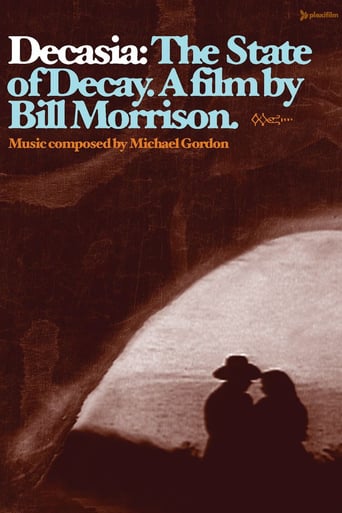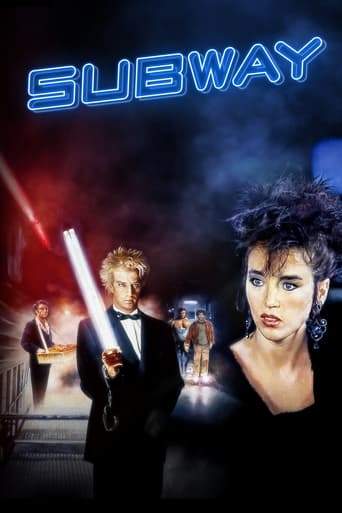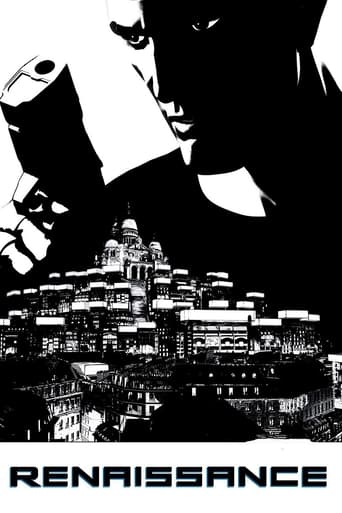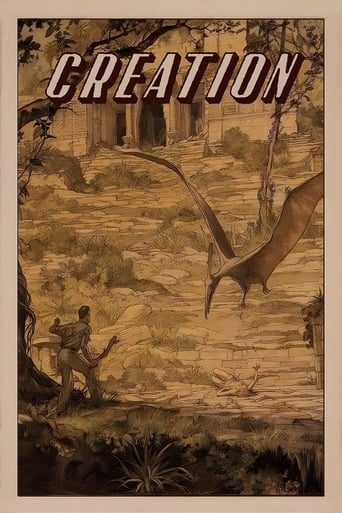

Decasia (2002)
A meditation on the human quest to transcend physicality, constructed from decaying archival footage and set to an original symphonic score.
Watch Trailer
Cast
Similar titles

Reviews
A Major Disappointment
A bit overrated, but still an amazing film
Although it has its amusing moments, in eneral the plot does not convince.
It's a mild crowd pleaser for people who are exhausted by blockbusters.
I loved Decasia, but for reasons that might evade others. Hence, I'm not inclined to recommend it.I get a wonderful, visceral response to extremely complex noise and chaos, and Decasia is nothing if not a rampaging smorgasbord of same. So, I was in heaven, watching it.I got a kick out of the music. I spent some of my viewing time reflecting on the composer's process. Fascinating!I suppose I should chime in on the mythic payload. Respectable, seasoned commentators ply a line about the film as a commentary on "morals". Pishposh! If I take away any arc from this piece, it's a running commentary on decay; that chaos deserves our respect. It a powerful idea. It's another reality that, once we face it, pushes us to self- actualization. It reminds me of the aesthetic of John Cage in this regard.One of my disappointments (strange to say, in light of what I said above) was discovering that the film's decay effects were also "found". Those effects were so wild, wooly, rich, redolent that I entertained (for the filmmaker) the conceit that they were meticulously engineered. Well, they *were* engineered, but by Loki, Eris, Kali, et.al. Which makes it all only that much more impressive, come to think of it....
Decasia isn't so much a movie, more an endurance test. It is about as far away from a mainstream blockbuster as the world of film is likely to get, composed as it is entirely of neglected film stock that has decayed over time. Bill Morrison may be classified as the director, but in truth, he's more of a collage-maker, tying all these images together and attaching a haunting score over the top then letting the results speak for themselves. It's certainly an interesting approach, but when you get down to the nitty-gritty, it doesn't half make for a boring film.Sure, you can wax lyrical about the otherworldly experience of watching long dead people going about their lives and how combined with the music, it creates a trance-inducing hypnotic effect, but sitting down to watch it and then talking about it afterwards are two completely different things. If you are a chain smoking nihilist with a beard and a beret you'll probably love it, or at the very least pretend to like it in order to look clever, but I thought it sucked. I'll stick to the Indiana Jones trilogy thanks very much.
The screening I saw had a very low walkout rate for an experimental movie, although admittedly the audience were mostly students taking Berkeley's avant-garde film course, so they probably had to be there. Poor kids, you might say, but this'll probably be one of the high points of their semester. It'll take you a few minutes to flesh out the decay metaphor (even film doesn't last forever so what chance do we puny humans have, etc.) but surprisingly a large proportion of the imagery continues to be affecting beyond that point.The game I play when viewing an unannotated found-footage work is to discover what scenes the filmmaker's way of seeing enhances, and why. I could draw up a list of (possibly false) dichotomies - human vs architectural, familiar vs exotic. The one that struck me, though, was documentary vs fiction. Bill Morrison (the same guy who worked on Futurama? Really?) uses excerpts from both categories, but all of the scenes that moved me were unscripted. When I watch a silent fiction film, the image on the screen is evidence that the characters, and thus the stars, are alive. When I watch old documentary footage, the first thought that comes to mind is "These guys must all be dead by now". Perhaps that's why I slightly prefer Gianikian's and Lucchi's all-doco "From the Pole to the Equator", even though that film makes "Decasia" seem as watchable as "Fantasia".But probably a pertinent reason is "From the Pole to the Equator" has a more useful soundtrack. Gordon's "Decasia" symphony sounds like a parody of Glass, which of course is still better than the score to "The Hours". My favourite bit of "Decasia" is when a long take of nuns 'n' schoolgirls is accompanied by a seemingly infinite collection of continuously descending string lines. Interestingly, Gordon reverses this trick at the end, using ascending lines, and it sounds just like the Beatles' "A Day in the Life". I would've been happier if Morrison had set the film to "Sgt. Pepper", as long as I didn't have to see decaying footage of Peter Frampton.Obscure references aside, "Decasia" is better than most avant-garde films because the pictures look nice, the same way a body lying in state looks nice, only better. Morrison is an outstanding undertaker.
I was unlucky enough to catch this film at the Boston Independent Film Festival. Upon reading the description of the movie, I was intrigued as I have always had a passionate love and fascination with old photography and films. The notion of seeing a collection of old decaying films artfully woven together sounded wonderful on paper, the actual film however leaves MUCH to be desired.The film's "score" (if it can even be called a score) is a painful melange of long drawn out sharps and flats that are akin to having a gremlin in one's head scratching a blackboard with their claws.This seemingly neverending barrage of ambient noise is the number one thing that is wrong with this film. I found myself squeezing my hands to my ears in the fashion of the "Hear no Evil" monkey and wishing that the theatre speakers would just give out.The film would have improved by 150% if the "music" had been exchanged for absolute silence, or the whir of a film projector. Aside from being beastly torturous to the ears, the score also had the unfortunate affect of changing the way you perceived what you were seeing on the screen. Because of the dreadful hopeless sound of the "music" it influenced your perception of the film dramatically and made you see all of the hopelessness in the film's subject matter.Some of the imagery used in the film was quite beautiful, the shapes and patterns created by the decaying celluloid could have been displayed separately as works of natural art on their own.There were a few noteworthy film sequences, a boxer who appears to be fighting against a pulsing column of nothingness, patrons at an amusement park who appear to be jetting out of the wavering nothingness of a black hole in roller coaster cars, a solarized man and woman going out for a stroll. However, it was the segments themselves that brought the small bit of beauty that there was to the film, there was nothing that the director did which in any way enhanced or did justice to the visuals that he collected.All in all this film seemed to me to be a selfish piece of art wherein the artist forcefully inflicts his own interpretation of his piece onto the entire audience and doesn't leave them any freedom to make their own judgments. The music told you how you were supposed to feel about the decaying films and the disintegrating characters shown in them. "Despair in the shortness of life and in the fact that death and decay is an unavoidable inevitability! Despair at the frailty of our existence!" The director got that message across within the first twenty minutes of the film, the rest could have been edited extensively and we all would have left the theatre much happier. The phrase beating a dead horse comes to mind, after twenty minutes of disintegrating celluloid and ambient noise, 50 more minutes of the same thing isn't going to do much good.And interesting side note, after the film was finished, not a single member of the audience applauded, so I imagine that I was not the only viewer who felt unimpressed by Decasia. Unless you are a rabid historical film buff with a taste for insanity-inducing musical scores, philosophizing on the futility of life and endlessly long and repetitive imagery, skip this film.

